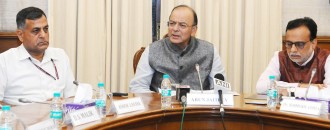
Indian tax authorities must follow global standards
Sai Nikesh | The Dollar Business  Income Tax authorities in India should focus more on the international accounting standard, say experts. A group of experts discussed changing faces of financial reporting and tax reporting and implementation of accounting standard at an event organized by the Confederation of Indian Industry (CII) on Thursday. Speaking at the inaugural session, H Srinivasulu, Member (Finance), Telangana State Electricity Regulatory Authority, and former Income Tax Commissioner, said, “Tax should be what the citizens like and not the government.” Explaining the changes that Indian tax system has undergone over the past few years, Srinivasulu made a mention of earlier sessions, which left key sectors like oil, agriculture, among others, out of the accounting standards. He also expressed concern over the weak tax collections in India, while pointing out to the country’s tax base that stood 3-3.5% at times. He called upon the Income Tax Department and other agencies to maintain time scheduling. Speaking to The Dollar Business, V V Parasuram, Convenor, CII Telangana Finance & Taxation Panel, said, “The seminar is aimed at taking the International Financial Reporting Standards (IFRS) and ICDS (Income Computation and Disclosure Standards) more into the public, especially the companies and stakeholders.” Removal of subjectivity by ignoring the concept of having ‘no prudence and materiality’ is the key challenge ahead in the tax system, he added. In his address, Sai Venkateshwaran, Partner and Head of Accounting Advisory Services, KPMG (India), highlighted the benefits of adopting global standard. He said the proper understanding of the global accounting standard will help in raising bar on the reporting framework, besides enhancing comparability by providing better investment options and ensuring the transparency in the processes. Talking about Indian accounting standard (IND-AS), he said that the IND-AS adoption roadmap cover companies having net worth of Rs 500 crore or more (debts or equities, in or outside India), besides the implementation regarding holdings, subsidiaries, joint ventures, among others. He also spoke about the regulatory perspectives, which sought clarity on minimum alternate tax (MAT), addressal of various challenges, for example, issues involving non-bank financial companies (NBFCs). Madhu Sudhan Kankani, Partner, KPMG (India), said that adopting Indian accounting standards could create greater comfort for investors, improve ability to raise capital overseas within a short notice, smoothen up global consolidation and consistency. Darshan Varma, Director, KPMG (India), asked companies to focus on the Income Computation and Disclosure Standards. He emphasized about materiality, early taxation of resources, proper classification of qualifying assets, higher capitalization of borrowing costs, and recognition of government grants. The KPMG study threw light on key considerations like delinking of taxation system from the accounting income and sought clarity on MAT and directives of the Institute of Chartered Accountants of India (ICAI).
Income Tax authorities in India should focus more on the international accounting standard, say experts. A group of experts discussed changing faces of financial reporting and tax reporting and implementation of accounting standard at an event organized by the Confederation of Indian Industry (CII) on Thursday. Speaking at the inaugural session, H Srinivasulu, Member (Finance), Telangana State Electricity Regulatory Authority, and former Income Tax Commissioner, said, “Tax should be what the citizens like and not the government.” Explaining the changes that Indian tax system has undergone over the past few years, Srinivasulu made a mention of earlier sessions, which left key sectors like oil, agriculture, among others, out of the accounting standards. He also expressed concern over the weak tax collections in India, while pointing out to the country’s tax base that stood 3-3.5% at times. He called upon the Income Tax Department and other agencies to maintain time scheduling. Speaking to The Dollar Business, V V Parasuram, Convenor, CII Telangana Finance & Taxation Panel, said, “The seminar is aimed at taking the International Financial Reporting Standards (IFRS) and ICDS (Income Computation and Disclosure Standards) more into the public, especially the companies and stakeholders.” Removal of subjectivity by ignoring the concept of having ‘no prudence and materiality’ is the key challenge ahead in the tax system, he added. In his address, Sai Venkateshwaran, Partner and Head of Accounting Advisory Services, KPMG (India), highlighted the benefits of adopting global standard. He said the proper understanding of the global accounting standard will help in raising bar on the reporting framework, besides enhancing comparability by providing better investment options and ensuring the transparency in the processes. Talking about Indian accounting standard (IND-AS), he said that the IND-AS adoption roadmap cover companies having net worth of Rs 500 crore or more (debts or equities, in or outside India), besides the implementation regarding holdings, subsidiaries, joint ventures, among others. He also spoke about the regulatory perspectives, which sought clarity on minimum alternate tax (MAT), addressal of various challenges, for example, issues involving non-bank financial companies (NBFCs). Madhu Sudhan Kankani, Partner, KPMG (India), said that adopting Indian accounting standards could create greater comfort for investors, improve ability to raise capital overseas within a short notice, smoothen up global consolidation and consistency. Darshan Varma, Director, KPMG (India), asked companies to focus on the Income Computation and Disclosure Standards. He emphasized about materiality, early taxation of resources, proper classification of qualifying assets, higher capitalization of borrowing costs, and recognition of government grants. The KPMG study threw light on key considerations like delinking of taxation system from the accounting income and sought clarity on MAT and directives of the Institute of Chartered Accountants of India (ICAI).
Foreign Trade | April 30, 2015 | 6:40 pm IST.

-Vertical.jpg)
-Vertical.jpg)



 to success.
to success.